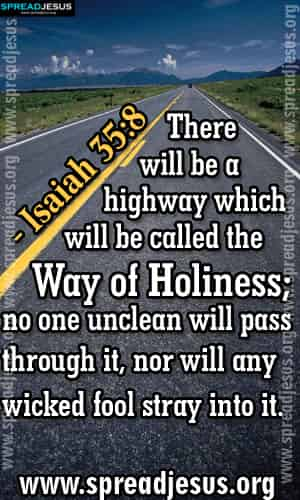"And a highway will be there; it will be called the Way of Holiness; it will be for those who walk on that Way. The unclean will not journey on it; wicked fools will not go about on it" (Isa 35:8, NIV).
In Isaiah 28-35 the central issue was the stupid advice of the leaders for Judah to trust Egypt, instead of God. Isaiah 34 poetically expresses that trusting in the nations results in a desert, while Isaiah 35 shows the drastic and dramatic contrast when one trusts God. In brief, God will turn the desert into a garden (Isa 35:1). "The burning sand will become a pool" and the places "where jackals once lay, grass and reeds and papyrus will grow" (Isa 35:7). This is in sharp contrast to the desolation that endured from generation to generation (Isa 34:10, 17). Even such desolation can be changed by God if we let him. God will reveal his glory by making them as rich and abundant as the forests on Lebanon and Carmel or the grasslands of the plan of Sharon (Isa 35:2; 33:9). When the rains of God fall, a barren waste springs into splendorous color almost overnight.
Isaiah 35 is the mirror image of Isaiah 34 about the fate of the arrogant nations and all who trusted in them. Isaiah 35 speaks of the destiny of those who turn from that path to a resolute trust in God. Though there is no mention of trust in ch. 34 and 35, yet it is the major theme in the larger context.
Isa 35:3-6a, 8 make it plain that this restoration is a spiritual one. The discouraged and fearful are given courage and strength (Isa 35:3-4). They remained faithful while the nation has gone down and down. They saw evil triumph again and again and wondered when or if God's day would ever come. But the Lord will balance the scales of justice, and they will see the day when both wickedness and righteousness receive their true reward from God (Isa 34:8, 16-17). In contrast to Isa 6:9-10, those who remain faithful--the blind and the deaf, the spiritually lame and mute will be delivered from their afflictions and become full participants in the community of faith (Isa 35:5).
Oswalt, John N. Isaiah: The New Application Commentary. Zondervan, Grand Rapids, Michigan. 2003. 391-395.

No comments:
Post a Comment